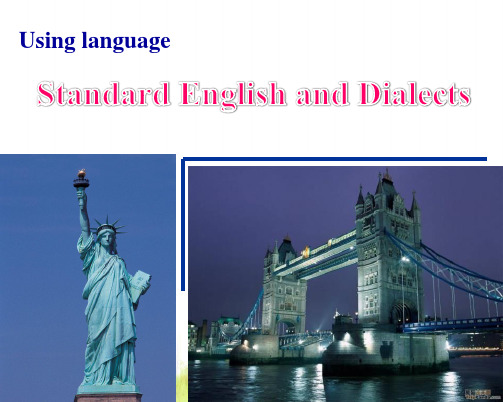1Unit2 Standard English AndDialects
- 格式:ppt
- 大小:475.50 KB
- 文档页数:12



Unit2 THE ROAD TO MODERN ENGLISHAt the end of the 16th century, about five to seven million people spoke English. Nearly all ofthem lived in ter in the next century, people from England made voyage s to conquer other parts of the world and because of that, Englis h began to be spoken in many other countries.Today, more people speak English as their first, second or foreign language than ever before.Native English speakers can understand each other even if they don`t speak the same kind of English. Look at this example.British Betty: Would you like to see my flat?American Amy: Yes, I`d like to come up to your apartment.So why has English changed over time?Actually all languages change and develop when cultures meet and communic ate with each other.At first the English spoken in England between about AD 450 and 1150 was very different from the English spoken today.It was based more on German than the English we speak at present.Then gradually between about A D 800 and 1150, English became less like German because those who ruled England spoke first Danish and later French. These new settler s enrich ed the English language and especially its vocabulary.So by the 1600`s Shakespeare was able to make use of a wider vocabulary than ever before.In 1620 some British settlers moved to ter in the 18th century some British people were taken to Australia too. English began to be spoken in both countries.Finally by the 19th century the language was settled.At that time two big changes in English spelling happened: first Samuel Johnson wrote his dictionary and later Noah Webster wrote The American Dictionary of the English Language. The latter gave a separate identity to American English spelling.English now is also spoken as a foreign or second language in South Asia.For example, India has a very large number of fluent English speakers because Britain ruled India from 1765 to 1947.During that time English became the language for government and education.English is also spoken in Singapore and Mala ysia and countries in Africa such as South Africa. Today the number of people learning English in China is increasing rapidly. In fact, China may have the largest number of English learners.Will Chinese English develop its own identity? Only time will tell.Unit 2△ subway /'sʌbwei/ n. 地下人行道;<美>地铁elevator /'eliveitə/ n. 电梯;升降机petrol /'petrəl/ n. <英>汽油(=<美>gasoline)gas /ɡæs/ n. 汽油;气体;煤气;毒气official /ə'fiʃl/ adj. 官方的;正式的;公务的voyage /'vɔiidʒ/ n. 航行;航海△ conquer /'kɔŋkə/ vt. 征服;占领because of 因为;由于native /'neitiv/ adj. 本国的;本地的 n. 本地人;本国人△ Amy /'eimi/ n. 艾米(女名)come up 走近;上来;提出apartment /ə'pɑ:tmənt/ n. <美>公寓住宅;单元住宅actually /'æktʃuəli/ adv. 实际上;事实上AD 公元base /beis/ vt. 以…为根据 n. 基部;基地;基础at present 现在;目前gradual /'ɡrædʒuəl/ adj. 逐渐的;逐步的gradually /'grædʒuəli/ adv. 逐渐地;逐步地Danish /'deiniʃ/ n. 丹麦语;adj. 丹麦的;丹麦的人;丹麦语的enrich /in'ritʃ/ vt. 使富裕;充实;改善vocabulary /və'kæbjuləri/ n. 词汇;词汇量;词表△ Shakespeare /ʃeikspiə/ 莎士比亚(英国剧作家,诗人)make use of 利用;使用spelling /'speliŋ/ n. 拼写;拼法△ Samuel Johnson /'sæmjuəl 'dʒɔnsn/ 塞缪尔·约翰逊(英国作家,批评家)△ Noah Webster /'nəuə 'webstə/ 诺厄·韦伯斯特(美国词典编纂家)latter /'lætə/ adj. 较后的;后半的;(两者中)后者的identity /ai'dentəti/ n. 本身;本体;身份fluent /'flu:ənt/ adj. 流利的;流畅的fluently /'flu:əntlɪ/ adv. 流利地;流畅地Singapore /siŋə'pɔ:/ n. 新加坡(东南亚国家)Malaysia /mə'leiziə/ n. 马来西亚(东南亚国家);马来群岛such as 例如……;像这种的frequent /'fri:kwənt/ adj. 频繁的;常见的frequently /'fri:kwəntli/ adv. 常常;频繁地usage /'ju:sidʒ/ n. 使用;用法;词语惯用法command /kə'mɑ:nd/ n. & vt. 命令;指令;掌握request /ri'kwest/ n. & vt. 请求;要求△ dialect /'daiəlekt/ n. 方言expression /ik'spreʃn/ n. 词语;表示;表达midwestern /mid'westən/ adj. 中西部的;有中西部特性的African /'æfrikən/ adj.非洲的;非洲人的;非洲语言的Spanish /'spæniʃ/ adj.西班牙的;西班牙人的;西班牙语的 n.西班牙人;西班牙语play a part (in) 扮演一个角色;参与eastern /'i:stən/ adj. 东方的;东部的southeastern /sauθ'i:stən/ adj. 东南方的;来自东南的northwestern /nɔ:θ'westən/ adj. 西北方的;来自西北的recognize /'rekəɡnaiz/ vt. 辨认出;承认;公认lorry /'lɔri/ n. <英>卡车(=<美>truck)△ Lori /'lɔri/ n. 罗丽(女名)△ Houston /'hju:stən/ n.休斯敦(美国城市)△ Texas /'teksəs/ n.得克萨斯州(美国州名)accent /'æksənt/ n. 口音;腔调;重音△ Buford /'bju:fəd/ n.布福德(姓氏;男名)△ Lester /'lestə/ n.莱斯特(姓氏;男名)△ catfish /'kætfiʃ/ n. 鲶鱼 lightning /'laitniŋ/ n. 闪电straight /streit/ adv. 直接;挺直 adj. 直的;笔直的;正直的block /blɔk/ n. 街区;块;木块;石块cab /kæb/ n. 出租车Unit2 STANDARD ENGLISH AND DIALECTSWhat is standard English?Is it spoken in Britain, the US, Canada, Australia, India and New Zealand?Believe it or not, there is no such thing as standard English.Many people believe the English spoken on TV and the radio is s tandard English.This is because in the early days of radio, those who reported the news were expected to speak excellent English.However, on TV and the radio you will hear differences in the way people speak.When people use words and expressions different from “standard language”, it is called a dialect.American English has many dialects, especially the midwestern, southern, African American and Spanish dialects.Even in s ome parts of the USA, two people from neighbouring towns speak a little differently.American English has so many dialects because people have come from all over the world.Geography also plays a part in making dialects.Some people who live in the mountains of theeastern USA speak with an older kind of English dialect.When Americans moved from one place to another, they took their dialects with them.So people from the mountains in the southeastern USA speak with almost the same dialect as people in the northwestern USA.The USA is a large country in which many different dialects are spoken.Although many Americans move a lot, they still recognize and understand each other`s dialects.。



Unit 2 English Around The World Reading---Standard English And Dialects主题语境:人与社会授课时长:一课时(40分钟)文本分析:本模块以English around the world为话题,旨在通过对这一话题的探讨加强学生对英语语言的了解,对当代语言特别是英语发展趋势的了解。
从一段对话开始,引出学生对英式英语和美式英语的概念,继而引出标准英语和方言的概念,启发学生对语言多样性的深入思考。
Using language- reading部分通过对话形式,体会到英美英语的差异,激发学生的学习兴趣;以任务型阅读的形式,带领学生深入理解文本,了解是否存在标准英语,英语方言的多样性,以及方言产生的原因。
通过本部分的学习,使学生感受到英语语言文化的差异,探究主题意义。
在处理文本的时候,穿插了“标准汉语和方言”这条暗线:文本处理过程中,引导学生掌握描述标准英语和方言的相关词汇,树立保护保护语言多样性的信念,同时为读后活动做铺垫;读后环节,引导学生先完成“AnIntroductiontoChinese”的相关表格,从点的层次,引导学生分析汉语特点。
紧接着引导学生完成“MandarinAnd Chinese Dialects”的报告,实现由点及面的不断延伸。
在作业布置环节,设置两层,一是导入了中国经典戏剧形式,让学生介绍自己最喜欢的戏剧;二是让学生介绍最喜欢的名著,并分享读后感。
学情分析:我所设计的阅读课针对的学生,是西飞中学高一某班。
该班的英语基础,阅读能力尚可。
学生的性格比较活跃,口语交流能力要稍微强些,并且他们求知欲都比较强,能主动配合老师,愿意开口讲,愿意交流。
因此,结合学生的实际情况,将教学情境化,灵活化,设置使他们感兴趣的活动、任务,因材施教,才能让班里的学生们投入到课堂活动中来,在快乐中有所学,有所获,从而促进我们教学的有效性与目标的实现。